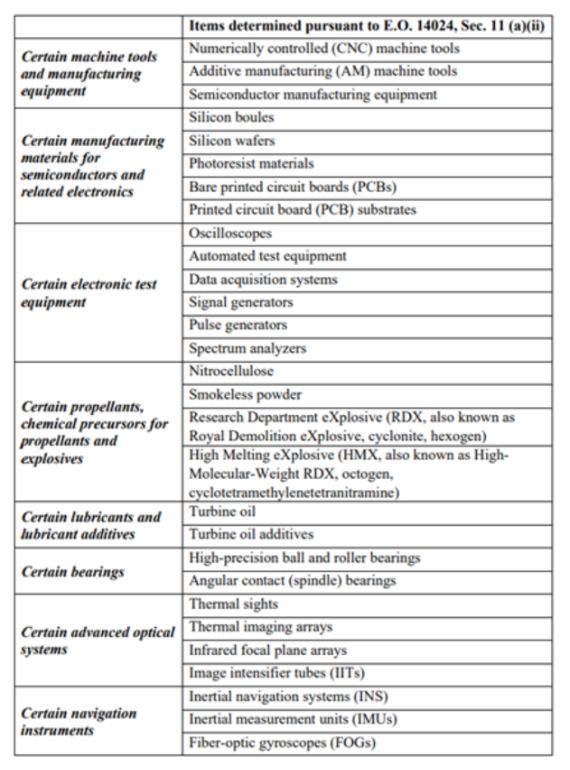- within Environment topic(s)
- with readers working within the Environment & Waste Management industries
December 22, 2023 – On December 22, 2023, President Biden issued a new Executive Order ("E.O."), "Taking Additional Steps With Respect to the Russian Federation's Harmful Activities," amending E.O. 14024 and E.O. 14068 to further target Russian sanctions evasion and support the U.S.'s commitment to the G7 Leaders' Statement, making clear to foreign financial institutions ("FFIs") that facilitating significant transactions relating to Russia's military-industrial base may expose them to U.S. sanctions.
Key Takeaways
For U.S. manufacturers and exporters, there are several key practical takeaways.
- First, expect FFIs—to the extent they have not already done so—to start engaging in de-risking due diligence over transactions that might expose them to the new scope of sanctions. Anticipating their questions and proactively engaging in dialogue is the best way to reduce the risk of payment delays due to misunderstandings.
- Second, this is yet another warning to manufacturers and exporters that—for sales bearing a high-risk of evasion or diversion—more than traditional sanctions screening methodologies are required. Treasury's guidance to FFIs in its Compliance Advisory released today should be interpreted as guidance to any company engaged in international trade—not just financial institutions.
- Third, the current U.S. Administration is steadfast in its commitment to put economic pressure on Russia—as long as the Ukraine war continues, expect the scope and intensity of U.S. sanctions enforcement to increase.
- Finally, the U.S. actions will further set the pace for E.U. sanctions and enforcement, coming only days after the E.U.'s own 12th round of Russia sanctions. All of these key takeaways portend more of the same in 2024.
Summary
The new amendment to E.O. 14024 authorizes the imposition of U.S. sanctions on FFIs that are either (1) facilitating significant transactions on behalf of persons designated for operating in certain key sectors of the Russian economy that support the country's military-industrial base; or (2) facilitating significant transactions or providing services involving Russia's military-industrial base, including those relating to specific manufacturing inputs and technological materials that Russia is seeking to obtain from foreign sources. This also authorizes the U.S. Department of the Treasury ("Treasury") to prohibit the importation of products having Russian-origin content that have been processed or substantially transformed in third countries, such as Russian seafood and diamond products. The expanded import prohibitions will be active once determinations are made naming covered goods.
Published Op-Ed by Treasury Official
In an op-ed titled, "The U.S. is Ready to Impose Sanctions on Foreign Financial Institutions When Others Don't", published in the Financial Times along with Treasury's actions on December 22, 2023, U.S. Deputy Secretary of the Treasury Wally Adeyemo noted "that the U.S. will level sanctions and export controls that undermine the Kremlin's efforts to stockpile goods and technologies," emphasizing that "those financing and facilitating the transactions of goods that end up on the battlefield will face severe consequences." The op-ed, along with today's actions, emphasize the Administration's intent to continue escalating sanctions on Russia until it ceases its aggression against Ukraine and the U.S. government's unprecedented targeting of FFIs that directly or indirectly facilitate sanctions evasion.
Detailed Review
Please see below for more details on today's actions.
New E.O. 14024 and E.O. 14068 Determinations
1. Determination Pursuant to Section 11(a)(ii) of Executive Order 14024 ("Russia Critical Items Determination")
This determination authorizes the U.S. government to impose sanctions on an FFI upon determining that the FFI has conducted or facilitated any significant transaction or transactions, or provided any service, involving Russia's military-industrial base, including the sale, supply, or transfer, directly or indirectly, to the Russian Federation, of any item or class of items as may be determined by the Secretary of the Treasury, in consultation with the Secretary of State and the Secretary of Commerce. Additionally, the determination applies to the following items or classes of items that were listed in the annex of the determination:

2. Determination Pursuant to Section 1(a)(i)(B) of Executive Order 14068 ("Seafood Determination")
This determination prohibits the importation into the United States of salmon, cod, pollock, and crab that were produced wholly or in part in the Russian Federation, or harvested in waters under the jurisdiction of the Russian Federation or by Russia-flagged vessels, notwithstanding whether such fish, seafood, and preparations thereof have been incorporated or substantially transformed into another product outside of the Russian Federation.
This determination was amended to prohibit the importation into the United States of gold of Russian Federation origin, unless licensed or otherwise authorized by OFAC. This determination excludes gold of Russian Federation origin that was located outside the Russian Federation prior to June 28, 2022.
General Licenses
Additionally on December 22, 2023, OFAC issued the following three Russia-related general licenses for transitional matters under the Russia Harmful Foreign Activities Sanctions Program:
1. General License 83, "Authorizing Certain Transactions Related to Imports of Certain Categories of Fish, Seafood, and Preparations Thereof Prohibited by Executive Order 14068"
General License ("GL") 83 authorizes all transactions prohibited by the determination of December 22, 2023 made pursuant to section 1(a)(i)(B) of E.O. 14068 that are ordinarily incident and necessary to the importation into the United States of seafood derivative products, pursuant to written contracts or written agreements entered into prior to December 22, 2023 through 12:01 a.m. eastern standard time, February 21, 2024.
2. General License 84, "Authorizing Transactions Related to Closing a Correspondent or Payable-Through Account"
GL 84 authorizes U.S. financial institutions that maintain correspondent accounts or payable-through accounts for any FFI subject to the correspondent account or payable-through account ("CAPTA") prohibition of section 11(b)(i) of E.O. 14024, as amended, during the 10-day period beginning on the effective date of the imposition of the prohibition, to engage in the following transactions: (1) Processing only those transactions through the account, or permitting the FFI to execute only those transactions through the account, for the purpose of, and necessary for, closing the account; and (2) Transferring the funds remaining in the correspondent account or the payable-through account to an account of the FFI located outside of the United States and closing of the correspondent account or the payable-through account.
3. General License 85, "Authorizing the Wind Down of Transactions and the Closure of Accounts Involving Expobank Joint Stock Company"
GL 85 authorizes all transactions prohibited by E.O. 14024 that are ordinarily incident and necessary to the wind down of any transaction involving Expobank Joint Stock Company ("Expobank"), or any entity in which Expobank owns, directly or indirectly, a 50 percent or greater interest, through 12:01 a.m. eastern daylight time, March 21, 2024, provided that any payment to a blocked person is made into a blocked account in accordance with the Russian Harmful Foreign Activities Sanctions Regulations, 31 CFR part 587 ("RuHSR"). Additionally, GL 85 authorizes certain transactions prohibited by E.O. 14024 that are ordinarily incident and necessary to (i) the closing of an account of a person, wherever located, who is not a blocked person ("the account holder"), held at Expobank, or any financial institution in which Expobank owns, directly or indirectly, a 50 percent or greater interest, and (ii) the unblocking and lump sum transfer of all remaining funds and other assets in the account to the account holder, including to an account of the account holder held at a non-blocked financial institution, through 12:01 a.m. eastern daylight time, March 21, 2024.
New and Amended Frequently Asked Questions ("FAQs")
Along with today's action, OFAC issued 12 new FAQs, 1146-1157 that provide guidance on the new determinations and executive order. Specifically, FAQ 1157 defines the terms "salmon," "cod," "pollock," and "crab" in the Seafood Determination, FAQ 1156 provides guidance on the wind down period to complete the import of certain seafood products that were contracted prior to December 22, 2023 and on finding a new buyer for shipments and/or re-directing the shipments to a country other than the United States and FAQ 1155 provides further guidance on what the Seafood Determination prohibits.
FAQ 1154 provides guidance on how the E.O. of December 22, 2023 amends E.O. 14068, FAQ 1153 provides guidance on how one can identify Specially Designated Nationals that operate in a particular sector that supports Russia's military industrial base, and FAQ 1152 provides guidance on how FFIs that engage in transactions in non-USD currencies could be sanctioned under section 11 of E.O. 14024, as amended by E.O. of December 22, 2023. Additionally, FAQ 1151 provides guidance on how OFAC intends to interpret the following terms in E.O. 14024, as amended by the E.O. of December 22, 2023: "foreign financial institution," "Russia's military-industrial base," and "significant transaction or transactions."
FAQ 1150 provides guidance on what the Russia Critical Items Determination does, FAQ 1149 provide guidance on what sanctions can be imposed on an FFI that engaged in conduct described in section 11 of E.O. 14024, as amended by the E.O. of December 22, 2023 and what the obligations of U.S. financial institutions are, FAQ 1148 provides guidance on what activities could expose an FFI to sanctions under section 11 of E.O. 14024, as amended by the E.O. of December 22, 2023, and FAQ 1147 provides guidance on how the E.O. of December 22, 2023 amends E.O. 14024.
OFAC also amended FAQs 973, 1070, and 1126. Specifically, OFAC amended FAQ 973 to clarify a U.S. person's obligations with respect to the maintenance of an account at an FFI sanctioned pursuant to Directive 2 under E.O. 14024, FAQ 1070 to reflect the amendment to the gold-related determination, and FAQ 1126 to reflect how OFAC defines the sectors identified under E.O. 14024.
Compliance Advisory: "Guidance for Foreign Financial Institutions on OFAC Sanctions Authorities Targeting Support to Russia's Military-Industrial Base" ("the Advisory")
In addition to the above actions, OFAC published a compliance advisory on December 22, 2023, "Guidance for Foreign Financial Institutions on OFAC Sanctions Authorities Targeting Support to Russia's Military-Industrial Base." The Advisory is meant to explain OFAC's new authorities to target FFIs for engaging in certain transactions and to provide guidance to FFIs on the amendments to E.O. 14024, including practical guidance on how to identify sanctions risks and implement corresponding controls.
The Advisory includes, among other things, the following examples of activities that could expose FFIs to sanctions risk under E.O. 14024 as amended:
- Maintaining accounts, transferring funds, or providing other financial services (e.g., payment processing, trade finance, insurance) for any persons designated for operating in the specified sectors.
- Maintaining accounts, transferring funds, or providing other financial services (e.g., payment processing, trade finance, insurance) for any persons, either inside or outside Russia, that support Russia's military-industrial base, including those that operate in the specified sectors of the Russian Federation economy.
- Facilitating the sale, supply, or transfer, directly or indirectly, of the specified items to Russian importers or companies shipping the items to Russia.
- Helping companies or individuals evade U.S. sanctions on
Russia's military-industrial base. This includes:
- offering to set up alternative or non-transparent payment mechanisms,
- changing or removing customer names or other relevant information from payment fields,
- obfuscating the true purpose of or parties involved in payments, or
- otherwise taking steps to hide the ultimate purpose of transactions to evade sanctions.
The Advisory notes that FFIs should use this list of specified items for the purpose of mitigating sanctions risk under Treasury's new sanctions authorities described in the Advisory. In addition, the Advisory includes pointers on how FFIs can identify and mitigate sanctions risks, highlights previous guidance on Russia sanctions and export controls evasion, and concludes with a summary of permissible transactions for FFIs.
Conclusion
Today's actions signal the U.S. government's commitment to escalating sanctions on Russia until Russia ceases its aggression against Ukraine. Notably among today's actions, the U.S. government's new authorities allow the U.S. to use secondary sanctions to target foreign banks indirectly aiding Russia's military. It also highlights the growing expectations placed on the financial industry with respect to export controls and sanctions compliance. FFIs that choose to continue to do business in Russia should ensure they are doing appropriate due diligence on counterparties and flows of goods, or risk being cut off from the U.S. financial system entirely.
The content of this article is intended to provide a general guide to the subject matter. Specialist advice should be sought about your specific circumstances.
[View Source]





